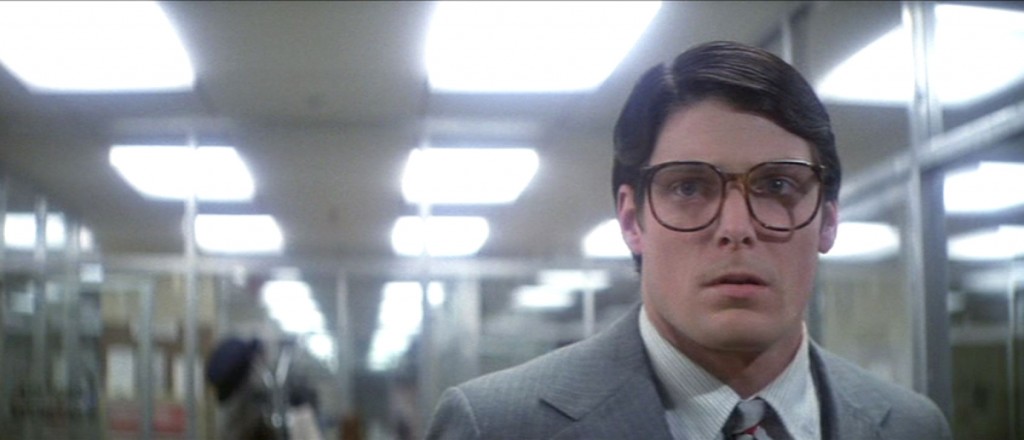Superman: Superman: The Movie part 5
Ninety minutes or so into Superman, Lex Luthor, in his luxurious basement, puts together a chain of logic that leads to a chance to murder Superman.
Here is his chain: Superman is from Krypton, which exploded. Exploding planets create debris. Debris, drifting through space, becomes meteorites. Meteorites from the exploded Krypton would have specific radioactive signatures. Ergo (his word), a meteorite from Krypton will kill Superman.
Let’s examine this a little more closely. Lex Luthor, by his own admission the most brilliant man in the world, has a plan to kill Superman that involves exposing him to a rock from his home planet. Let’s set aside, for the moment, the fact that no aspect of his chain of logic makes any sense whatsoever. The first question is, why does Lex Luthor need a plan to kill Superman? We know at this point that he has some kind of diabolical scheme in play, but why does that create a pressing need to kill Superman, indeed, a need that supersedes all planning for his nefarious plot? For that matter, why, if Lex Luthor has a diabolical scheme, do we never see him actually executing any aspect of that scheme? Ninety minutes into the movie, all we have seen Lex do is lounge, swim, proclaim his greatness, insult his underlings and bitch about stuff. Whatever his evil plot is, its implementation takes up not one second of his time.
Okay. So, Lex Luthor has a plan, which he doesn’t need to do any work to pursue, or at least any work that the cinematic narrative needs to examine, and he’s suspending whatever non-work he has to do in order to hatch a more pressing scheme to kill Superman. Why, again, does he need to kill Superman? Supeman doesn’t even know Lex exists, much less know anything about his evil plan. Lex is “worried” in a vague sense that Superman might foil his scheme, but he has no evidence whatsoever that this is a genuine threat to his activities. Then, on top of that, his plan to kill Superman involves this thing with a meteorite, which makes sense on no level at all. In Lex’s mind, meteorite = rock from Krypton, and rock from Krypton = death to Superman. The fact that this turns out to be true is coincidence, the opposite of a conclusion brought about through deductive reason.
What is going on here? Why does the screenplay for Superman, ninety minutes in, at a point where most movies are wrapping up their climaxes, suddenly, and without any narrative logic at all, create a plot to kill its title character? The answer, I think, is that the filmmakers think that the audience expects that to happen. They think that the audience expects from a superhero narrative a cartoonish, blustering buffoon of a villain, one with nothing better to do with his time than plot evil schemes to foil our hero. Where does this come from? I don’t know. Even the dumbest villains from the Batman TV show still did things in pursuit of a goal, not just because they’re evil. “Because he’s bad” is the laziest motivation for a villain. No villain in real life is motivated by “Because I’m Bad.” Even Satan has a legitimate beef against God. The narrative of Superman snaps like a twig here, all the stuff about who Kal-El is, what his father wanted, what Jonathan Kent wanted, what choices Kal-El will make now that he’s a man, all those worthwhile narrative concerns are thrown right out the window when the movie needs to find a “plot” for Superman to address. It settles for the most generic kind of dualism: “I must kill Superman because he’s good and I’m bad.” It’s that moment when the filmmakers betray their audience because, deep down, they don’t like their source material, don’t think it’s worthy of serious attention, think it’s for indiscriminate children.
(PS: a bad-guy plot that revolves around “Because I hate the protagonist” is only one step up in its worthlessness.)
In any case, ninety-seven minutes into the movie, Lex actually sets about putting his primary evil scheme into motion, which involves locating nuclear missile convoys and changing the programming on the missiles. Because the army and navy are, for some reason, practicing a joint nuclear-missile test that day. While Lex re-programs the missiles, Lois interviews a Native American about the crazy guy who’s been buying up worthless desert land.
What’s Superman doing during all this? Nothing. He’s not out rescuing cats, he’s not stopping jet planes from crashing, he’s not foiling criminals. He’s just kind of wandering around like a doofus in his Clark Kent getup, wondering what to do next. It’s almost like we’ve suddenly entered into a much different, much dumber movie, more like Batman: The Movie, something much campier and low-stakes. For all its spectacle, the final act of Superman chucks all the gravity and mythos-building of its first half and settles for a plot better suited for a low-budget serial.
So Lex lures Superman to his lair, to have him trapped while his plot goes into motion. His re-programmed missiles are launched (apparently no one in either the army or navy would bother to check the coordinates before launch) and he calmly explains his plot to Superman. Superman, with all his powers, is apparently a complete idiot with no detective skills whatsoever. He can hear things from miles away, but he doesn’t know when Lois has gone on assignment, he can see through anything move with the speed of light but has to stand and listen patiently for a villain to slowly explain his plot. This, alas, is, I think, how America likes its heroes: physically impressive, not too bright.
Luthor’s plan, for those not in the know, involves dropping one of his re-programmed missiles on the San Andreas fault, which will plunge California into the sea and create a new West Coast, owned by Lex. Settting aside for the moment that none of Lex’s ideas are factually based, his plan creates an enormous Monday Morning problem: on Monday, after California has plunged into the sea, millions of people have been killed, hundreds of cities have been lost, why does Lex think he’ll be able to keep his land? Why does he think that the US government will just say “Well, he bought the land fair and square, he owns it now, maybe he caused the greatest loss of life in human history do it but a contract is a contract?”


Is “Othello” a bad guy plot that revolves around “because I hate the protagonist?”
Good question! We never really find out why Iago decides to mess up Othello’s life, but we never really find out why Iago does anything. Iago continues to fascinate for that reason. He reminds me a lot of Hannibal Lecter, who’s just built that way – he has a need to corrupt everything around him. It would be awesome if Lex Luthor rose to the level of either of those characters, but he’s really a petty, childish creation.
One of the reasons I think this works for Iago is that *he* thinks he’s got good reason for hating Othello, claiming that eg Othello passed him over promotion, or that he thinks Othello slept with his wife. It’s the audience that looks at Iago’s multiple, contradictory, motivations and begins to suspect Iago hates Othello for hatred’s sake.
Gene Hackman certainly seems to enjoy himself as Luthor, and in ‘Superman Returns,’ Kevin Spacey seems to enjoy playing Hackman-as-Luthor, but the character never seems like a worthy adversary of Superman.
If Superman functions as an all-American allegory for good and evil (which might be going a little far), The Kents are essentially all good, Luthor is is all evil and the staffers of the Daily Planet are the flawed regular humans in between the extremes.
Outside of the films, two interesting things about Lex Luthor are:
1. He *should* be the best that America/mankind has to offer, as a self-made man (in some conceptions) and scientific genius turned captain of industry, with no special powers. He’s a lot like an evil version of Bruce Wayne, with enormous financial and technological resources and an obsession to achieve a specific goal (avenging his parents/thwarting Superman).
2. He’s a human being with no superpowers who resists an alien with godlike abilities. If Superman weren’t so pure of heart, I may not be sure who to root for.
My favorite Superman villain is not actually a traditional Superman villain, but Darkseid, as dramatized in the ‘Superman: The Animated Series’ and ‘Justice League’ shows. If Superman is messianic figure, Darkseid functions as the next best thing to Satan himself: S:TAS even includes a scene with Darkseid trying to tempt Superman when they’re both on a mountaintop. Plus, Darkseid can go toe-to-toe with Superman in Big Fight Scenes.
Lex has always been best when he’s one of the smartest men in the world, a self made man, a ruthless business man, but more importantly *the antithesis of Superman’s use of power*.
Lex has no superpowers, but he’s super powerful. Incredibly rich and incredibly smart, but still incredibly selfish. There is a moment in All Star Superman I think where Superman goes “cure cancer yet, Lex?”. That’s great because it illustrates Lex’s philosophy of power. He could use it to better mankind, like Superman, but instead he uses it to his own personal ends.
In his head, Lex is standing up to this alien demigod who thinks he can enforce the law as he sees fit. He’s the shinning example of human ingenuity. He dares to be as good– NO BETTER than this inhuman, this space monster, who never had to work for anything. LEX crawled and scraped to where he is now.
But in reality Lex could care less about humanity or the world in general. It’s always just been about Lex and Lex alone.
“He’s a human being with no superpowers who resists an alien with godlike abilities. If Superman weren’t so pure of heart, I may not be sure who to root for.” That’s a great point. Chris Roberson and Dennis Culver explore the idea of a Luthor-like figure becoming a good guy in their comic Edison Rex:
http://www.monkeybraincomics.com/titles/edison-rex/
The Luthor stuff really is where the movie crumbles. My impression is that the producers (and Hackman?) wanted the whole movie to be a lot more Adam West and a whole lot less mythic and what the filmmakers settled upon was to hang all dumb humor and buffoonery upon the villains. There is a sense of the notion that if Luthor is the worst of humanity, then he should come off as small and foolish. Of course, iit doesn’t play. And yeah all sense of logic goes out the window.
And yet… there is something about Hackman’s Luthor. I know that making the bad guy bad because he is bad makes for bad storytelling and that every villain is a hero in her own eyes. But there is something interesting about Objectivist Luthor, about a man who holds selflessness and philanthropy in contempt and considers greed and criminality to be virtues. This particular film does not convincingly sell that character but there is something worthwhile in the notion of Luthor as Howard Roark.
I’d have to look it up, but I think I remember reading that Hackman was slumming. He certainly didn’t read any Superman comics to see what Lex Luthor is like. He also didn’t do reshoots for the sequel and wouldn’t even come back for ADR work, so a number of his lines in Superman II are done by a voice-over artist.